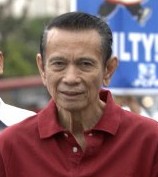
Former Vice President Teofisto Guingona Jr., Automated Election System (AES) Watch honorary chairman, said the Comelec should not rely on a foreign company like Smartmatic in conducting elections in the Philippines. AFP FILE PHOTO
Several individuals, among them supporters of Chief Justice Renato Corona, and groups, including one led by former Vice President Teofisto Guingona Jr., asked the Supreme Court on Tuesday to stop the Commission on Elections (Comelec) from buying for P1.8 billion the voting machines used during the 2010 elections.
In three separate petitions, the groups questioned the legality of the Comelec’s contract with Smartmatic Corp. for the purchase of more than 80,000 precinct count optical scan (PCOS), which the Comelec would use for the midterm elections next year.
In its 18-page petition for certiorari, the Automated Election System (AES) Watch said the contract was a “clear and patent violation” of the law on public bidding of government projects and contracts.
AES Watch said the Comelec should not have approved the agreement with Smartmatic because it was made way beyond the commission’s option to buy the PCOS machines on Dec. 31, 2010.
It said the contract would “cause grave and irreparable injury to the petitioners and the entire Filipino people, as well as the political and economic future and integrity of this country.”
“Therefore, considering that the option to purchase had long expired, the purchase of the PCOS requires a public bidding for its validity since this would involve a new contract altogether,” the group said.
It also questioned the Comelec’s decision not to heed the recommendation of its own advisory council “not to exercise [its] option” to buy the machines.
“This unjustified and unexplained disregard by Comelec of the [Comelec Advisory Council’s] recommendation clearly constitute[s] grave abuse of discretion,” the group added.
Guingona, AES Watch honorary chairman, said the Comelec should not rely on a foreign company like Smartmatic in conducting elections in the Philippines. He warned that the Comelec “will only be used by that company.”
“It should be the Comelec that should conduct the elections and not a foreign company because that is our right,” Guingona told reporters before filing the petition.
“There were lapses and glitches [during the 2010 elections],” Guingona said. “The technicians considered Smartmatic as students who failed and now we are going to reward them again by giving them the contract again,” he added.
Lapses, glitches
“I think we should take cognizance of the lapses and glitches and have better elections,” he said.
A group led by Davao City Archbishop Fernando Capalla, former Marawi City Mayor Omar Ali and former Quezon City Representative Mary Anne Susano filed a separate petition.
The Solidarity for Sovereignty, a group headed by Ma. Linda Montayre, also submitted a similar motion. Ramon Pedrosa, Benjamin Paulino Sr., Evelyn Coronel and Nelson Montayre joined her as petitioners.
The group had initiated rallies in support of Corona, who is undergoing impeachment trial in the Senate on charges of graft, violations of the Constitution, and betrayal of the public trust.
Comelec Chairman Sixto Brillantes Jr. welcomed the challenge to his agency’s contract with Smartmatic.
He noted that the filing of the petitions came quickly and said he hoped the Supreme Court would also quickly resolve the controversy.
If the resolution takes time, “we might have problems [with] our timetable,” Brillantes told reporters.
“We’ll see if a temporary restraining order will be issued or not,” he said. “If not, our work will go on.”
Asked what the Comelec would do if a TRO was issued, Brillantes said: “We’ll talk about alternatives. It’s good if the TRO will be issued early so we’ll have enough time to change the course if needed.”
Brillantes explained that the Comelec knew its decision to buy the PCOS machines would be challenged in the courts. “That’s why we made the decision early—so that it could be elevated to the Supreme Court [early, and] we can have an early resolution,” he said.
Plan B
Brillantes appealed to the Supreme Court to resolve the controversy soon “so that we will not run out of time [in preparing for the elections]. If a TRO is issued, he said, “we will have to stop everything.”
Brillantes said the Comelec had a “Plan B”—conduct a new bidding.
“That’s why we want to have a [Supreme Court] decision early,” Brillantes said. “There are requirements under the procurement law and we have to comply with them.”